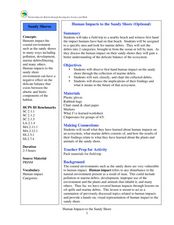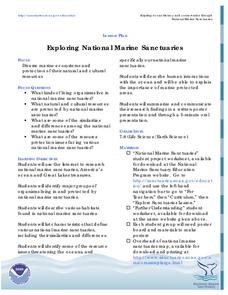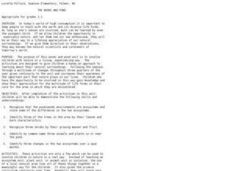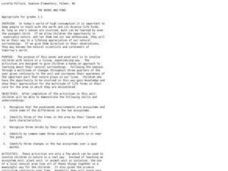Curated OER
Point- vs. Non-point Pollution
Students differentiate between point and non-point pollution and determine how the different types of pollution are harmful to aquatic ecosystems. They complete a series of tests on a sample of "polluted" water and a sample of "pure" water.
Teach Engineering
Food Chains and Food Webs - Balance within Natural Systems
Feast on an informative resource. Scholars learn about food chains and food webs and how these interactions give information about the natural community. A PowerPoint presentation provides information about this concept.
Teach Engineering
Extinction Prevention via Engineering
It's time to save endangered species through engineering. The third lesson in a nine-part Life Science unit has young environmentalists study species extinction. An engaging discussion leads to some ideas on how to use engineering design...
Curated OER
Human Impacts to the Sandy Shore
Students investigate human impact on coastal environments. In this coastal environment lesson, students observe human impact on coastal environments. Students sort, classify, and chart marine debris collected on a local beach.
Curated OER
Seeds of Wetland Life
Students participate in several activities on seed exploration. In this biology lesson, students classify seeds according to their dispersal method. They explain the different adaptations plant have to disperse their seeds.
Curated OER
Exploring National Marine Sanctuaries
Students research marine ecosystems by creating class presentations. In this oceanography lesson, students research the different locations of marine sanctuaries by identifying them on a transparency map in class. Students...
Curated OER
The Woods and Pond
Students participate in hands-on activities to explore their natural surroundings. They recognize that ponds and woods are ecosystems and compare differences between the two. They identify trees by their bark and leaves.
Forest Foundation
Forest Families
Class groups play a Forest Families card game to reinforce concepts presented in the first six sessions of a nine-instructional activity study of tress and forest ecosystems.
Curated OER
Bat Program
Students, through hands on games and activities, discover how bats live and how bats benefit ecosystems. They play a game designed to show them how echolocation works. They take a quiz to dispel some of the myths associated with bats.
Curated OER
Scales, Scutes, and Skins
Students identify the various adaptations of reptiles and amphibians. After distinguishing between reptiles and amphibians, students discuss the ways in which their adaptations aid in their survival. They participate in a hands on...
Polar Trec
Bering Sea Fabulous Food Chain Game
In spring, the Bering Sea turns green due to phytoplankton, which live at the surface, experiencing a population explosion. Groups of scholars play a food chain game, writing down food chains as the game is played. After five to six...
Teach Engineering
Red Cabbage Chemistry
Using the natural pH indicator of red cabbage juice, groups determine the pH of different everyday liquids. As they work, pupils gain an understanding of pH that may help deal with contaminants in the water supply.
Curated OER
Reduce, Reuse, Recycle
Fourth graders discover the differences between: reduce, reuse, and recycle by performing hands on examinations. They list what would happen to the soil if we allowed the earth to wash away and briefly discuss the meaning of erosion.
Curated OER
Science Trail
Fourth graders explore the concept of ecosystems. In groups, they examine clues to find mystery objects. Once they find the mystery objects, they discuss what ecosystem each comes from. They also look at pond water samples under a...
Curated OER
How Many Penguins Does It Take? Studying Carrying Capacity and Limiting Factors
How does a population's habitat determine the size of that population? Teach learners about carrying capacity and limiting factors with an engaging roleplay activity. Class members pose as a colony of penguins who must gather food amidst...
Curated OER
Aquatic Organisms and Their Habitats
Students investigate the presence of specific organisms in a freshwater habitat to determine the quality of that habitat. They conduct a field study and distinguish and classify organisms found during the field study.
Curated OER
Go With the Energy Flow
Learners explore energy and nutrient flow. For this science lesson, students diagram the flow of energy through food chains and food webs. Learners discuss the importance of energy flow in Earth's ecosystems.
Curated OER
One World Ocean
Students compare and contrast the properties of salt water in the oceans/seas and freshwater elsewhere on the planet. They also analyze mixing caused by currents in the ocean, including the effects of warm and cold water as well as with...
Curated OER
Wind and Wildfire
Emerging scientists research weather-related vocabulary terms, and map out where wildfires are most likely to occur. To bring this lesson plan to life, you could demonstrate what happens to a fire when you cool or remove the fuel, or cut...
Curated OER
Bye-Bye Bison
Fourth graders investigate the bison's struggle for survival. They discuss the importance of bison while participating in an role playing activity showing how important the food supply and surroundings are to their survival.
Curated OER
Fire Fighting
Students consider the effects of a wildfire on prairie life. They explore the ways that plants regenerate after a fire and create fictional plants that have adapted specifically to the prairie environment. They share models of their plants.
Curated OER
Does the increased use of fertilizers effect biodiversity?
Students conduct a hands-on lab activity in which they analyze a sample of water from a local stream or pond. They introduce a fertilizer solution into the sample and analyze and describe their findings.
Curated OER
The Woods and Pond
Students explore nature in a living, experiencing way. For this woods and ponds lesson plan, students recognize that ponds/woods environments are ecosystems, identify three of the trees in the area by their leaves and bark...
Curated OER
Discovering The Oasis
Students participate in a lesson that is concerned with the ecosystem of a local pond. The teacher makes arrangements for students to take a field trip. Time is spent in class for preparation and afterward for debriefing of lab...























